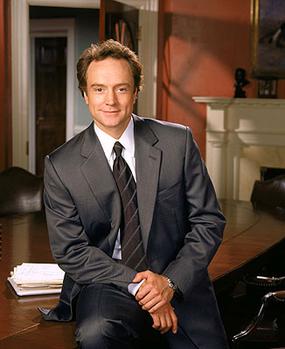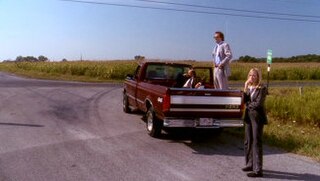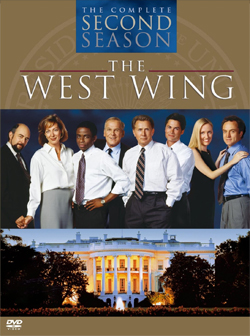Related Research Articles

The West Wing is an American serial political drama television series created by Aaron Sorkin that was originally broadcast on NBC from September 22, 1999, to May 14, 2006. The series is set primarily in the West Wing of the White House, where the Oval Office and offices of presidential senior personnel are located, during the fictitious Democratic administration of President Josiah Bartlet.

Josiah Edward "Jed" Bartlet is a fictional character from the American television serial drama The West Wing created by Aaron Sorkin and portrayed by actor Martin Sheen. The role earned Sheen a Golden Globe Award for Best Actor – Television Series Drama in 2001, as well as two SAG Awards.

Leo Thomas McGarry is a fictional character of the NBC political drama series The West Wing, portrayed by American actor John Spencer.
Samuel Norman Seaborn is a fictional character played by Rob Lowe on the television serial drama The West Wing. From the beginning of the series in 1999 until the middle of the fourth season in 2003, he is deputy White House Communications Director in the administration of President Josiah Bartlet played by Martin Sheen. The character departed from subsequent seasons after Lowe decided to leave the series, although he returned for several episodes in the final season when he became Deputy Chief of Staff to the new president portrayed by Jimmy Smits.

Joshua Lyman is a fictional character played by Bradley Whitford on the television drama series The West Wing. The role earned Whitford the Primetime Emmy Award for Outstanding Supporting Actor in a Drama Series in 2001. For most of the series, he is White House Deputy Chief of Staff and Chief Political Advisor in the Josiah Bartlet administration.

Tobias "Toby" ZacharyZiegler is a fictional character in the television serial drama The West Wing, played by Richard Schiff. The role of Toby Ziegler earned actor Richard Schiff the Primetime Emmy Award for Outstanding Supporting Actor in a Drama Series in 2000. For most of the series' duration, he is White House Communications Director. In the final season, Ziegler is involved in a storyline around a leak of classified information, which The New York Times compared to the leak investigation of the Valerie Plame affair.
The Vela incident was an unidentified double flash of light detected by an American Vela Hotel satellite on 22 September 1979 near the South African territory of Prince Edward Islands in the Indian Ocean, roughly midway between Africa and Antarctica. Today, most independent researchers believe that the flash was caused by a nuclear explosion—an undeclared joint nuclear test carried out by South Africa and Israel.
"Pilot" is the first episode of the American serial drama The West Wing. The episode aired on September 22, 1999 on NBC.
"Celestial Navigation" is the fifteenth episode of the first season of the American serial political drama The West Wing. The episode aired on February 16, 2000 on NBC. The episode depicts Josh Lyman narrating a story from the past few days to a collegiate audience, as well as the President's nominee to the Supreme Court being arrested for drunk driving. The episode was widely regarded as lighter and more humorous than other episodes of The West Wing.
"Bartlet for America" is the tenth episode of the third season of American serial political drama The West Wing. The episode aired on December 12, 2001 on NBC. The episode features Leo McGarry, the White House Chief of Staff, testifying before a congressional committee after it is revealed that the administration has been covering up the President's multiple sclerosis. Reception of the episode was mostly positive, and the slogan of "Bartlet for America" has been reprised in popular culture and real-life American politics.
"Hartsfield's Landing" is the fifteenth episode of the third season of The West Wing, an American serial political drama. The episode aired on February 27, 2002, on NBC. The episode takes its title from the fictional bellwether town that is central to the episode, which is holding an election that Josh Lyman wants to win for the president. "Hartsfield's Landing" also includes Toby Ziegler and Sam Seaborn playing chess matches against President Jed Bartlet, and C. J. Cregg involving herself in a prank war against Charlie Young. Allison Janney, who portrayed C. J., described the episode as one of her favorites. In 2020, the episode was reprised by the original cast in A West Wing Special to Benefit When We All Vote.

"20 Hours in America" is the two-part fourth season premiere of The West Wing. The episode aired on September 25, 2002 on NBC. In the episodes, President Josiah Bartlet deals with multiple crises, including a cover-up of the assassination of a foreign dignitary, while Josh Lyman, Toby Ziegler, and Donna Moss attempt to return to the White House after they are accidentally left behind in Indiana.
"Game On" is the sixth episode of the fourth season of The West Wing. The episode aired on October 30, 2002, on NBC. The episode features Josiah Bartlet, the President of the United States, debating against his opponent in the upcoming presidential election, as well as Sam Seaborn meeting the new character of Will Bailey and Leo McGarry attempting to stop the shipment of arms to a terrorist group. Reception for the episode was mixed, with differing viewpoints on how the show portrayed the dueling ideologies of liberalism and conservatism in the United States.
"The Supremes" is the seventeenth episode of the fifth season of American serial political drama television series The West Wing. It originally aired on NBC on March 24, 2004. In "The Supremes", the White House senior staff, under Democratic President Josiah Bartlet, looks to nominate a judge to the Supreme Court of the United States when Josh comes up with a plan to, instead of nominating a centrist to the seat, nominate one liberal and one conservative candidate to two seats on the Court. The episode was met with mixed reception, although it was later noted the show bore similarities to the 2016 death and replacement of real-life Supreme Court Justice Antonin Scalia.

The first season of the American political drama television series The West Wing aired in the United States on NBC from September 22, 1999, to May 17, 2000, and consisted of 22 episodes.

The second season of the American political drama television series The West Wing aired in the United States on NBC from October 4, 2000 to May 16, 2001 and consisted of 22 episodes.

The fifth season of the American political drama television series The West Wing aired in the United States on NBC from September 24, 2003, to May 19, 2004, and consisted of 22 episodes. This was the first season with executive producer John Wells as showrunner after series creator Aaron Sorkin departed the series at the end of the previous season.
"A Proportional Response" is the third episode of the first season of The West Wing, an American serial television drama. The episode aired on October 6, 1999 on NBC. The episode centers around the continuation of a storyline introduced in the previous episode, in which a plane carrying a new friend of President Bartlet was attacked by the Syrian government. The episode also sees the introduction of Dulé Hill as Charlie Young, and an argument between C. J. Cregg and Sam Seaborn over Sam's decision to befriend a call girl.
"17 People" is the eighteenth episode of the second season of American serial political drama The West Wing. The episode aired on April 4, 2001 on NBC. The episode depicts Josiah Bartlet, the President of the United States, informing his aide Toby Ziegler of startling news about the President's condition, as well as other members of the cast trying to rewrite a humorous speech the President is to give. The episode was generally praised for its intensity, as well as its complexity and stark contrast between plotlines.
References
- ↑ "The Warfare of Genghis Khan". NBC.com. Archived from the original on May 10, 2008. Retrieved 2007-05-26.
- ↑ "The Warfare of Genghis Khan". The West Wing Episode Guide. Retrieved 2007-05-26.
- ↑ Jeffrey Richelson, Spying on the Bomb: American Nuclear Intelligence from Nazi Germany to Iran and North Korea (New York: W. W. Norton, 2006), chapter seven, "The Double Flash: The Vela Incidence, September 1979", pp. 283-316.
- ↑ "The Pluto Campaign". The Planetary Society. Retrieved 22 July 2015.
- ↑ Calderone, Julia. "If you missed the best images of Pluto, you can catch them on the side of a NYC skyscraper starting this weekend". Business Insider. Retrieved 22 July 2015.
- ↑ "Voyager approaching solar system's final frontier". NASA. Retrieved 22 July 2015.
- ↑ McCabe, Janet (2012). The West Wing. Wayne State University Press. p. 87. ISBN 9780814338094. OCLC 779877458.